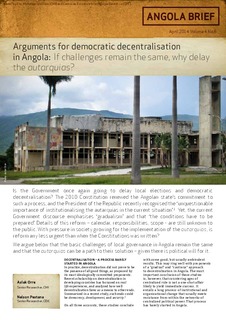| dc.contributor.author | Orre, Aslak | |
| dc.contributor.author | Pestana, Nelson | |
| dc.date.accessioned | 2018-01-04T08:20:30Z | |
| dc.date.available | 2018-01-04T08:20:30Z | |
| dc.date.issued | 2014-04-01 | |
| dc.identifier | oai:www.cmi.no:5126 | |
| dc.identifier.citation | Bergen: Chr. Michelsen Institute (Angola Brief vol. 4 no. 6) 4 p. | |
| dc.identifier.issn | 1892-3933 | |
| dc.identifier.uri | http://hdl.handle.net/11250/2475114 | |
| dc.description.abstract | Is the Government once again going to delay local elections and democratic decentralisation? The 2010 Constitution renewed the Angolan state’s commitment to such a process, and the President of the Republic recently recognised the “unquestionable importance of institutionalising the autarquias in the current situation”. 1 Yet, the current Government discourse emphasises “gradualism” and that “the conditions have to be prepared”. Details of this reform – calendar, responsibilities, scope - are still unknown to the public. With pressure in society growing for the implementation of the autarquias, is reform any less urgent than when the Constitutions was written?
We argue below that the basic challenges of local governance in Angola remain the same and that the autarquias can be a path to their solution – given there is political will for it. | |
| dc.language.iso | eng | |
| dc.publisher | Chr. Michelsen Institute | |
| dc.relation | Angola Brief | |
| dc.relation | 6 | |
| dc.relation.ispartof | Angola Brief | |
| dc.relation.ispartofseries | Angola Brief vol. 4 no. 6 | |
| dc.relation.uri | https://www.cmi.no/publications/5126-arguments-for-democratic-decentralisation-in | |
| dc.subject | Angola | |
| dc.title | Arguments for democratic decentralisation in Angola: If challenges remain the same, why delay the autarquias? | |
| dc.type | Report | |
